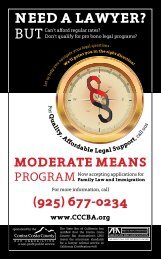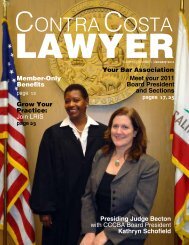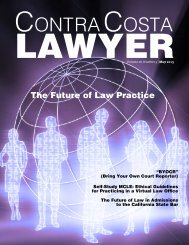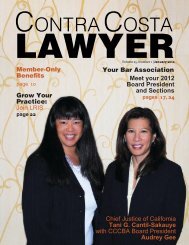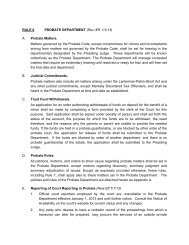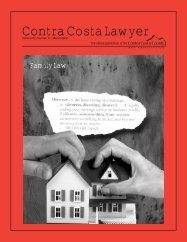Alternative Dispute Resolution Issue - Contra Costa County Bar ...
Alternative Dispute Resolution Issue - Contra Costa County Bar ...
Alternative Dispute Resolution Issue - Contra Costa County Bar ...
Create successful ePaper yourself
Turn your PDF publications into a flip-book with our unique Google optimized e-Paper software.
Pro BonoSpotlightThomas William CainNervous plaintiffs and defendants sit in court waiting for their small claims matters to be called. Before their matters are heard, however,they are told that the court would like them to try mediation. Are they familiar with this process? Many shake their heads “no.” The courtexplains the basics of mediation and points to the experienced mediators at the back of the courtroom. These are the volunteers from theCongress of Neutrals, and they are there to help the parties resolve their disputes without resorting to a hearing before the court. For many, itwill be their first exposure to mediation. • The Congress of Neutrals, run by Tom Cain and a Board of Directors, is a volunteer organizationthat coordinates mediation for the <strong>Contra</strong> <strong>Costa</strong> Superior Courts. Nicole Mills sat down with Tom to learn more about the Congress.How did the Congress of Neutrals get started?It grew out of comparative law study andan ADR survey on which I worked from1995 to 1998 around the Bay Area. It’samazing how “local” law varies — ADRreferrals and protocols differ from courtroomto courtroom and county to county.The Congress was incorporated in 2000.In 2001 we met with Superior Court benchofficers and <strong>Contra</strong> <strong>Costa</strong> ADR officers toplan mediation referral protocols, designforms, and discuss cases suitable and notsuitable for mediation.What ADR services does the Congress provide?For the Superior Court, the Congress providesmediators for small claims cases, civilharassment cases and unlawful detainers.We also maintain a panel of experiencedmediators, arbitrators and neutral assessorswith a variety of professional backgrounds.The trick is to match the professional/mediator to the dispute and disputants.What is the typical number of mediations theCongress conducts for the court each year?The use of mediation in the Superior Courthas increased year after year. In 2003, forexample, we conducted 98 mediationsfor <strong>Contra</strong> <strong>Costa</strong> <strong>County</strong>. In 2007, we did848 mediations. We continue to look forevery opportunity to use ADR to help theparties resolve their disputes on their ownand decrease court’s case load.How does the Congress develop newmediators and volunteers?The Congress is committed to providingquality mediators to aid the parties andthe court. To that end, we are constantlytraining and retraining. We have aMediation Mentoring Program (MMP)that matches up new mediators with amentor — an experienced mediator — towalk and talk the trainee through his orher first mediation, to get positive feedback,and to provide experience.What other training does the Congress offer?In addition to MMP, we offer a 40-hourmediation training, which is designed toprovide the initial training that allmediators require, as well as a 25-hourmediation training. For mediators whohave already had their 40-hour training,we offer advanced mediation training andspecialized training in elder law mediation.For municipal agencies, we have speciallydesigned training and conflict managementtraining. Finally, for the legal communityin general, we offer various MCLEprograms throughout the year.What about programs to reduce workplace conflict?The Congress provided training to KaiserPermanente over a four-year period. Wedesigned training and dispute resolutionreferral systems to help line workers, em -ployees and managers spot problems andresolve them in place before they escalate.The Congress deals largely with self-representedlitigants. How does that affect the waymediations are conducted?How to conduct effective and ethicalmedi ations with a self-represented litigant(SRL) is one hot topic. When can / shouldthe mediator do evaluative-style mediation?What limitations should be inplace on an evaluation if the SRL has notconsulted with an attorney? Obviously,evaluation by a mediator / attorney ishelpful if it gives the SRL the opinion ofone legal professional. But how informedis that opinion? Does the mediator/attorney really know the facts or understandthe evidence? How can you remainneutral under these circumstances?Doesn’t the SRL rely too heavily on theopinion of the mediator / lawyer? Theseare all considerations that must be takeninto account when mediating with an SRLthat are not always present when theparties are represented by counsel.24 November 2009



